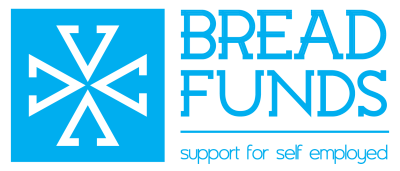Short Summary
Bread funds, or "broodfonds" as they're known in the Netherlands where they originated, are groups of 20–50 self-employed workers who pay into a shared fund in order to create as a financial safety net for ill members who cannot continue working.Website addresses: Breadfunds UK and Breadfunds Netherlands
Location: Netherlands and UK

Bread Funds UK logo.
source ![]()
Profile
One member of a bread fund, Jackie Smeets, describes her experience as follows:
"It feels good to have that independence from banks and insurance companies. For me, it’s a new dynamic in society. It’s small scale, it’s personal and it’s about taking care of each other." (source)
As of June 2021, there are a total of 27,990 freelancers participating across 620 bread funds groups (source).
While bread funds have helped many people and received a great deal of positive response, they are not immune to critique:
"The logistics of the plan suggest that financial risk for the group is greatest in the first years of participation, when members have little savings. According to Tijs van den Boomen, opinioning [sic] in de Volkskrant [see here], the associated fees and costs in 2011 for members were too high. He also estimated the risk of illness among members in the first few years so great, that payments for sick leave risked being cut especially if the group remained small or if several members suddenly left the group. He felt that freelancers were better off individually saving money for sick leave than save in a small-scale 'crumbs-collective'." (source)
Dutch politicians differ in their view of bread funds (source). Some support them as a way for self-employed people to ensure their own financial security. Others believe that self-employed people should be required to purchase often costly income protection insurance. And others believe that the government should re-institute the WAZ (which ended in 2004, as described in the "Origin Story" section of this listing).
YOUTUBE dJPfNG2I_t0 Explanation of bread funds in Dutch
Governance
Each fund is overseen by a board of elected members, which turns over after a period of time. At meetings organized by these boards, existing members can develop relationships as well as recommend new members.Each group must have a minimum of 20 members and a maximum of 50 members. According to Biba Schoenmaker, a member-founder of the first bread fund, because the system is based on trust each group cannot be too large:
“Because they’re based on trust, you have to get to know other participants. ... When you have more people, it will be more anonymous and maybe people will misuse the fund by asking for a gift when they’re not ill. When everybody knows each other, people won’t do that kind of thing." (source)
Friends & Partners
- BroodFondsMakers, a Netherlands-based co-op founded in 2010 to assist in the establishment of new bread funds
Finances
Bread funds' contribution and withdrawal system works as follows:"Payouts are based on need and members can choose from eight levels of contribution. For example, for a monthly gift of €1,000, the contribution is €45 a month; for €2,000, it is €90. Unlike insurance companies, there is no risk assessment or medical questionnaire.The money does not go into a central pot. Each member has their own separate bread fund account, which is managed by the board, so a sick member will receive a small monthly gift from each of the other members. If someone leaves the fund, they can withdraw their share, although exits are only allowed at two points during the year." (source)
Origin Story
The first bread fund was launched in the Netherlands in 2006, in response to the termination of sick pay for self-employed people in 2004 (known as WAZ—the Wet arbeidsongeschiktheidsverzekering zelfstandigen, or Self-employed Persons Disablement Benefits Act). Bread funds began to move to the UK around 2017, when pilot programs began there.See Also
- Other commons categories that are related to this one's, or specific similar examples
Sources
- The Guardian, "Payment insurance co-ops popular in Netherlands are reaching UK shores" (2014)
- RSA blog, "Bread Funds: A pioneering model of self-organising among the self-employed" (2017)
- Broodfonds YouTube channel
- Broodfonds Wikipedia page
- Report by Bread Funds UK for the Independent Review of Employment Practices in the Modern Economy (2017)